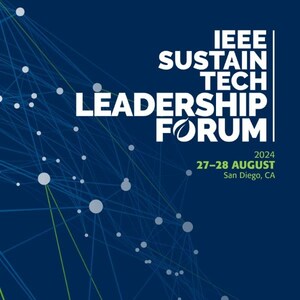LOS ALAMITOS, Calif., Nov. 26, 2018 /PRNewswire/ -- As accounts of technological change commonly focus on what works and what doesn't, the October 2018 issue of Computer magazine, the IEEE Computer Society's flagship publication, examines the diverse and unexpected impacts made by the far-reaching concepts of winning and losing in computing technology. "Winning and Losing in IT" reveals the complexities of computing and what winning or losing in IT might mean for different people and from different perspectives.
"The idea of winning and losing in IT raises questions about what these terms really mean for the 'real world,'" write guest editors Robert N. Charette of ITABHI Corporation and John Leslie King of the University of Michigan. "Simple metrics such as market capitalization, patents granted, profit generated, level of market penetration, safety, and liability are increasingly accompanied by the more complicated issues of environmental impact, diversity, civil rights, and social justice. Engineers are increasingly called upon to consider such factors and effects in their work. This special issue explores the kinds of issues that arise when considering what it means to win or lose in IT."
A core focus of this special issue is on the growing range of consequences that must be considered with emerging technologies in IT and elsewhere. The special issue presents seven thought-provoking articles by top researchers, including the following, as summarized from the Guest Editors' Introduction.
"Autonomous Tools in System Design: Reflective Practice in Ubisoft's Ghost Recon Wildlands Project," by Stefan Seidel, Nicholas Berente, Benoit Martinez, Aron Lindberg, Jeffrey Nickerson, and Kalle Lyytinen, take a case study to explore why finding the balance between craftsmanship and automation, training designers, and building the right organization to be successful, is a challenge.
"Increasing Women and Under-Represented Minorities in Computing: The Landscape and What You Can Do," by Telle Whitney and Valerie Taylor, provides insights from two veterans of the long struggle to increase diversity in the computing field. To get "all people at the table creating the technology that is changing our lives" requires both knowing how to create change and doing it.
"Winning at Innovation," by Peter Denning, points out that innovation is less about inventing and more about adopting new practices within a community. Innovation depends on human agency. Humans, not technology, drive innovation. Innovators show a concern, followed by a desire to do something about that concern. They create a story about how things can be better, offer to build what is needed, mobilize commitments to the offer, and build the infrastructure for sustainment.
In "Innovation and Inertia: Information Technology and Education in the US," Jonathan Grudin delves into the interesting history of education and its institutions, providing us meaningful context for why an application area that has always been fertile with hope for improvement from use of technology, often finds implementation more complicated to realize when technology is tried.
"When Winning is Losing: Why the Nation That Invented the Computer Lost Its Lead," by Marie Hicks, is a remarkable story about damage done to the UK computer industry by the systematic exclusion of women, many of whom had played crucial roles in making the UK a world leader in computing. From a point of view seldom explored, we can see that sexism led to the collapse of the UK's computing industry. This was not natural evolution, but programmed inequality.
In "Winning and Losing in Large-Scale Software Development: A Multi-Decade Perspective," Walt Scacchi examines a half-century effort to improve large-scale software development, noting wins and losses related to intellectual property, requirements, components, the organization of production, maintenance, and evolution. Large-scale software systems are expensive and important, part of the saga of innovation. For these reasons they remain difficult to create "according to plan."
"The Disappeared: Beyond Winning and Losing" by Lynn Conway provides a personal perspective on the VLSI revolution, which nearly everyone thinks of as an example of winning. However, as a transgender person who began her transition from male to female a half century ago and played a pivotal role in the VLSI revolution (but later disappeared from the history on the subject), the author saw the VLSI revolution from more than one point of view.
For more information, visit Computer magazine here.
Computer explores new cutting-edge technologies, discoveries, and innovations. With readership that includes over 100,000 technology professionals, it covers all aspects of computer science, computer engineering, computing technology, and applications. For more than 40 years, developers, researchers, and managers have relied on Computer for timely, peer-reviewed information about research, trends, best practices, and changes in the profession. Offering feature-rich multimedia—including videos, podcasts, and additional Web content—the extraordinary reputation and popularity of Computer magazine make it a sought-after source of peer-reviewed publications for researchers and technologists.
About IEEE Computer Society
The IEEE Computer Society is the world's home for computer science, engineering, and technology. A global leader in providing access to computer science research, analysis, and information, the IEEE Computer Society offers a comprehensive array of unmatched products, services, and opportunities for individuals at all stages of their professional career. Known as the premier organization that empowers the people who drive technology, its unparalleled resources include membership, international conferences, peer-reviewed publications, a unique digital library, standards, and training programs. Visit www.computer.org for more information.
SOURCE IEEE Computer Society
Related Links
WANT YOUR COMPANY'S NEWS FEATURED ON PRNEWSWIRE.COM?
Newsrooms &
Influencers
Digital Media
Outlets
Journalists
Opted In






Share this article